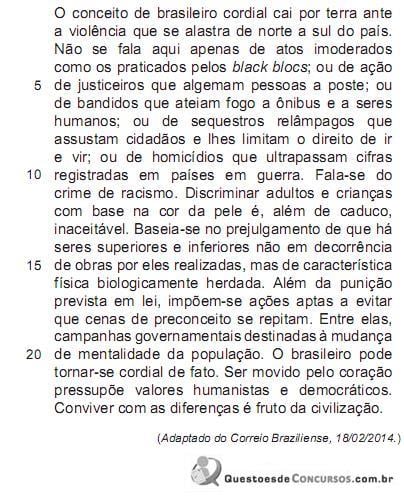Questões da Prova ESAF - 2014 - Receita Federal - Auditor Fiscal da Receita Federal - Prova 01
Foram encontradas 70 questões
Resolva questões gratuitamente!
Junte-se a mais de 4 milhões de concurseiros!
Depois de cair logo após a reforma do regime previdenciário do setor público de 2003—que extinguiu a aposentadoria integral __1__ servidor que ainda não contava __2__ direito e fixou condições mais rigorosas __3__ novas aposentadorias—,a proporção dos servidores inativo sem relação ao total de funcionários da União se estabilizou e,__4__gradual envelhecimento médio dos funcionários ativos, poderá voltar a crescer __5__ pouco tempo.Um estudo divulgado __6__ pouco pela Escola Nacional de Administração Pública (Enap) mostra que, atualmente, os inativos dos Três Poderes e do Ministério Público Federal representam 48% do total de servidores.Entre os servidores civis do Poder Executivo Federal a proporção é ainda maior: 52%
(Adaptado de O Estado de S. Paulo, 17/02/2014.)
Sem __1__ pujança econômica de outrora, __2__ Europa registra nos últimos tempos o fortalecimento de pressões xenófobas e anti-imigração.Após __3__ crise global, iniciada em 2008, e o consequente aumento dos índices de desemprego no continente, grupos de extrema- direita conquistaram níveis inéditos de participação nos Parlamentos nacionais da Suécia e da Grécia.Não satisfeitos em exercer__4__ representação política, tais agremiações têm protagonizado lamentáveis episódios de agressão__5__minorias de outras nacionalidades.
(Adaptado de Folha de S. Paulo, 12/02/2014.)

In order to assist its Members improve the effectiveness of their enforcement efforts and achieve a balance between control and facilitation, the World Customs Organisation has developed a comprehensive technical assistance and training programmes. In addition, it has established Regional Intelligence Liaison Offces (RILOs) that are supported by a global database, the Customs Enforcement Network (CEN), to facilitate the exchange and use of information.
The WCO has also developed instruments for international co-operation in the form of the revised Model Bilateral Agreement (MBA); the Nairobi Convention, which provides for mutual administrative assistance in the prevention, investigation and repression of Customs offences; and the Johannesburg Convention, which provides for mutual administrative assistance in Customs matters. The WCO’s Customs Control and Enforcement programme therefore aims to promote effective enforcement practices and encourage co-operation among its Members and with its various competent partners and stakeholders.
(Source: http://www.wcoomd.org/en/topics/enforcement-and-compliance/ overview.aspx, retrieved on 12 March 2014.)
In order to assist its Members improve the effectiveness of their enforcement efforts and achieve a balance between control and facilitation, the World Customs Organisation has developed a comprehensive technical assistance and training programmes. In addition, it has established Regional Intelligence Liaison Offces (RILOs) that are supported by a global database, the Customs Enforcement Network (CEN), to facilitate the exchange and use of information.
The WCO has also developed instruments for international co-operation in the form of the revised Model Bilateral Agreement (MBA); the Nairobi Convention, which provides for mutual administrative assistance in the prevention, investigation and repression of Customs offences; and the Johannesburg Convention, which provides for mutual administrative assistance in Customs matters. The WCO’s Customs Control and Enforcement programme therefore aims to promote effective enforcement practices and encourage co-operation among its Members and with its various competent partners and stakeholders.
(Source: http://www.wcoomd.org/en/topics/enforcement-and-compliance/ overview.aspx, retrieved on 12 March 2014.)